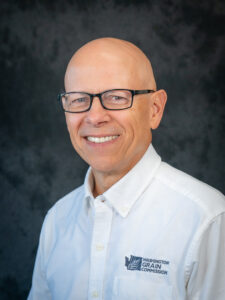 Glen Squires, CEO of the Washington Grain Commission (WGC), will retire on Nov. 1. Squires has served with the WGC for 30 years, the last 10 as CEO.
Glen Squires, CEO of the Washington Grain Commission (WGC), will retire on Nov. 1. Squires has served with the WGC for 30 years, the last 10 as CEO.
“Glen has guided the WGC through some big changes to our industry, especially in the last several years, pivoting to keep things running through the pandemic. He has been a relentless advocate for Washington small grains and our state’s growers, and we are better off today because of his efforts,” Mike Carstensen said. Carstensen is a dryland wheat farmer from Almira, Wash., and the current chairman for the WGC’s board of commissioners.
The grain commission is a state organization funded by assessments levied on wheat and barley at the first point of sale. Based in Spokane, the WGC represents seven wheat and barley grower districts across Washington. Casey Chumrau is the incoming CEO. Chumrau comes to the WGC from the Idaho Wheat Commission, where she served as executive director
“Glen has always been committed to ensuring Washington grain was of the highest quality. I am grateful for his dedication to the industry and wish him well in retirement,” said Derek Sandison, director of the Washington State Department of Agriculture.
Squires has been involved with trade, marketing, research, transportation and analysis at the commission for many years.
“Envisioning the transition from large government wheat buyers to more privatized wheat purchasing, my predecessor, Tom Mick, initiated the emphasis on quality here in Washington and throughout the Pacific Northwest. I’ve worked hand in hand with our commissioners to enhance our ability to effectively meet and exceed the needs of an increasingly sophisticated market to remain competitive,” he said.
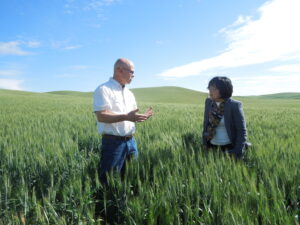
Squires has a master’s degree in agricultural economics from Washington State University (WSU), with an emphasis in international trade, and a bachelor’s degree from Utah State University in business administration-agribusiness with an emphasis in food marketing.
“Glen’s collegial, creative approach to our work has been instrumental in placing the WGC as a trusted and reliable partner for U.S. Wheat Associates (USW) and all of the countries and customers that we collectively serve. We have a huge debt of gratitude that goes with Glen,” said Vince Peterson, president of USW, which is the export market development organization for the U.S. wheat industry.
“I am sure that this retirement will be only partial, since those who have a desire to serve and continue to grow in their obligations within the beautiful world of wheat will always be in the forefront together with their friends,” Andrea Saturno wrote upon learning of Squires’ retirement. Saturno was the first technical programming manager for USW in South America and worked with Squires and others to enhance the demand for soft white wheat in that market through the education and promotion of blending soft white wheat into other wheats.
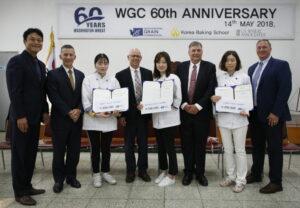
With customers who buy wheat from the U.S. and the state of Washington, Squires’ philosophy has been to address the issue, whatever it was, meeting customers on their own turf. According to Squires, his parents taught and lived the values of trust, integrity, relationships, attention to detail and determination to “just keep at it” — all characteristics that he worked to apply in his own life and career representing wheat and barley farmers.
“Over his career, Glen has worked hard to unite the Washington grain industry and create a strong working relationship with the Washington Association of Wheat Growers (WAWG) that utilizes the strengths of each organization,” said Michelle Hennings, executive director of WAWG. “His dedication to growers and his passion for this industry have elevated Washington wheat’s profile and put a spotlight on the world-class quality of our crop. I have thoroughly enjoyed working with Glen and have the utmost respect for his accomplishments and dedication to the industry. We wish him well in retirement.”
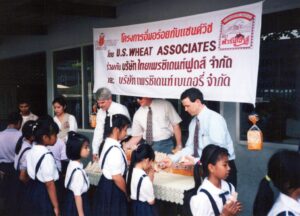
Squires traveled the world over his tenure with commissioners, working with customers to promote small grains. There have been many successes with WGC’s many collaborators. One example is the support and implementation of the Solvent Retention Capacity test for millers, which is an alternative method for predicting flour functionality in wheat-based food processes, thus enhancing the value and sale of soft white wheat.
With Patricia Dailey, former staff at Idaho Wheat Commission, he authored LOGISTIX, a transportation newsletter for the Northwest grain industry. Squires was also a principal architect of the annual Preferred Wheat Varieties brochure, which is a ranking of Eastern Washington, Oregon and Northern Idaho wheat varieties using six components to evaluate quality. Washington was the first state in the U.S. to rank varieties for quality in 1997, with Oregon and Idaho joining the effort soon after.
Squires developed relationships and important friendships with buyers throughout Asia, Latin America and the Middle East. He met customers in their mills and offices to promote wheat and address issues. He was on the first USW team to enter Hanoi, Vietnam, to promote U.S. wheat. According to Squires, experiences early in his career in Karachi, Pakistan, served to provide him a measure of constant awareness and heightened appreciation for life.
“As CEO of the grain commission, Glen has been an outstanding partner and supporter of research and Extension activities conducted by Washington State University (WSU) faculty and U.S. Department of Agriculture’s Agricultural Research Service (USDA-ARS) scientists. His leadership continues to advance wheat quality and production — both critically important to our overseas markets and growers here in Washington state,” said Rich Koenig, chair for the department of crop and soil sciences at WSU.
“There must be sustained research, with laws and regulations that support the business of food production. Food does not come from the grocery store. Ultimately, it is the farmers and ranchers who passionately pursue the art of producing our food. They enable the rest of society to pursue their passions. It is important to support and enhance the ability and capacity of those who produce our food,” Squires said.
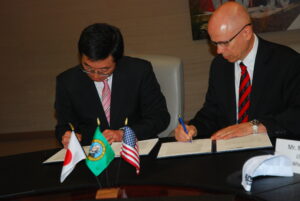
An additional milestone was a collaboration formalized in 2018 with the Japan Flour Millers Association (JFMA) to establish and strengthen the support system for the development of various varieties of white club wheat. The WGC leads the annual technical exchange based on sample analysis conducted by JFMA. This knowledge exchange provides a critical feedback loop from end-use customer to the USDA-ARS Northwest regional wheat breeding program. The information is used to advance high-quality, high-producing future varieties and breeding lines of club wheat that would satisfy the end-use demands of the industry.
According to Squires, the best success of all was working with producers, overseas customers and legislators and developing and maintaining the outstanding working relationships the WGC enjoys with a wide range of agricultural stakeholders, especially grain handlers, WAWG, the Washington Wheat Foundation and the phenomenal worldwide staff of USW.
Squires grew up on a small farm in north-central Utah. He is a Washington AgForestry Leadership graduate (class 19). Squires serves as president of the Pacific Northwest Waterways Association and is a strong advocate for its work on behalf of producers, ports, shippers and allied industries. He was also active with USW, serving as chairman of the sanitary, phytosanitary committee. Prior to COVID, he was chairman of a weeklong outdoor camp for 2,000 young men as part of his involvement in youth mentoring. Glen and his wife, Charlotte, have five children and 10 grandchildren.
“It has been an honor to work on behalf of the constituents of the WGC. Working with the commissioners and team members of the WGC has been a privilege,” Squires said. “This is a remarkable industry providing food for peoples of the world.”
This article originally appeared in the October 2022 issue of Wheat Life Magazine.

Lori Maricle, APR
Lori Maricle is the communications director for the Washington Grain Commission.
